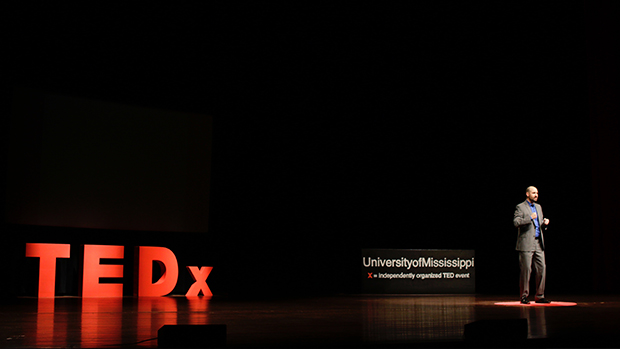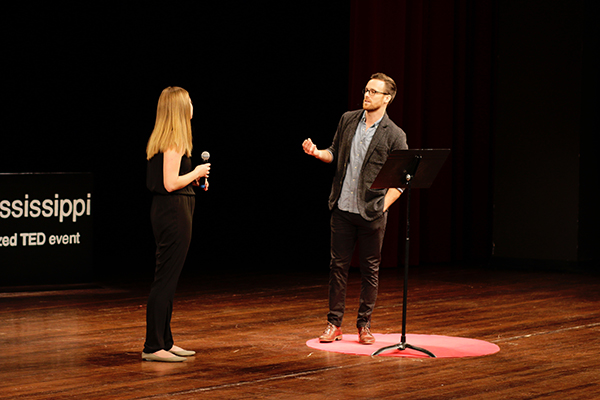
The University of Mississippi will host its third TEDx University of Mississippi February 3 at the Gertrude C. Ford Center for the Performing Arts, which includes seven speakers who will give brief, thought-provoking lectures with the theme ‘MOMENTUM.’
This year’s lineup of faculty members, a grad student, a law student and others will discuss a variety of topics ranging from how substance abuse is treated by the criminal justice system to lessening the dependence on foods that come from slaughterhouses.
The event is completely organized and designed by Ole Miss students with the original theme ‘MOMENTUM,’ which celebrates the diversity of people and ideas that are collectively moving our world forward.
“We are thrilled to invite the community to what will be the best TEDx event we have hosted here in Oxford since its founding,” says Marvin King, associate professor of political science and African-American studies, who serves as TEDx faculty adviser. “The ‘MOMENTUM’ talk series is designed to embody both the spirit of both the university and of TEDx, so we are excited for a full lineup of great talks that reflect that.”
King says he is proud of the energy the student-led committee has brought to the event.
“They have selected the speakers, created the stage layout and designed the entire brand identity for the event,” says King. “They’re all in. Each year we produce a better event and this year will be no exception. We’re very excited to bring TEDx back to Ole Miss for a third time. We think it’ll be a fun and engaging show, complete with a live music intermission.”
The list of speakers includes:
- Brian Foster a UM professor of sociology and Southern studies , will talk about the interpretive power of missing stories—the absence of an entire demographic group from certain spaces, the desire of an individual to repress or ‘move on from’ certain memories, the quiet pauses of conversation—that teaches us about ourselves, each other, and how societies change—or don’t.
- Emily Frith, a UM grad student, will talk about the complex process of creative thinking, where the goal is not merely to be creative, but to produce a solution that has value, either on a personal level or on a broad scale. She will explore how society can learn to problem-solve and problem-find using trainable creativity tactics, the implications could be instrumental in this modern age of excellence in education and innovation.
- Josh Horton, a graduate of the UM School of Law, will talk about his conviction that addiction should not be treated as a stigmatized moral failure, and start re-integrating those who have been pushed to the fringes of society. From inmate to advocate, Horton’s journey from a substance abuser with a criminal rap sheet to a Magna Cum Laude J.D. influences his passion to advocate for restorative communities and legal processes for recovering addicts nationwide.
- Elsie Andre, an 8th grader at Lafayette Middle School, will talk about how idea of travel does not have to be confined to physically seeing the world. Elsie points to examples from her own travels and experiences along with more well-known examples and research to show how traveling can lead to creativity in artistic expression, flexible thinking, creative problem solving, and compassionate action.
- Janet McCarty will talk about how being introduced to simple, instinctual behaviors from an unconventional mentor can transform the human perspective and the way we pursue our goals and dreams. She will introduce a few simple behaviors she learned from her mentor and applied to her life. Putting these behaviors into practice gave McCarty a unique perspective on life, allowing her to achieve her dream of becoming an entrepreneur
- Leena Patel will address “Gamulation”, the practice of using games and simulation to improve teaching and learning, specifically in the workplace. She will answer the question, “Wouldn’t work be a better place for most of us if we were having more fun?”
- Jacy Reese, will take about “clean meat”, which refers to real meat made from animal cells without animal slaughter. He will focus on social solutions informed by breakthroughs and historical successes will eventually allow for an ethical and efficient food system where slaughterhouses are obsolete.
For more information visit their official website here. ![]()



